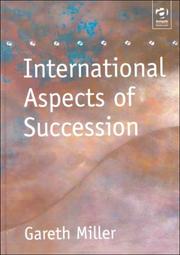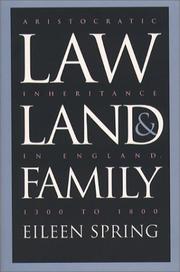| Listing 1 - 10 of 155 | << page >> |
Sort by
|
Book
ISBN: 0748698493 9780748698493 9781845861285 1845861280 Year: 2013 Publisher: Dundee
Abstract | Keywords | Export | Availability | Bookmark
 Loading...
Loading...Choose an application
- Reference Manager
- EndNote
- RefWorks (Direct export to RefWorks)
What happens after you die? You can't take it with you, so succession law governs how your property is passed on after your death. Succession Law Essentials teaches you all you need to know about the Scots laws of succession, including estates, executors, wills, will substitutes, valid and invalid testimony, intestate succession, legacies, vesting and more. Summary sections of Essentials Facts and Essential Cases will help you to identify, understand and remember the key elements, and tables of cases and statutes will help you to find the page you're looking for quickly and easily.
Inheritance and succession --- Bequests --- Descent and distribution --- Descents --- Hereditary succession --- Intestacy --- Intestate succession --- Law of succession --- Succession, Intestate --- Real property --- Universal succession --- Trusts and trustees --- Law and legislation
Book
ISBN: 9020005057 Year: 1977 Publisher: Deventer
Abstract | Keywords | Export | Availability | Bookmark
 Loading...
Loading...Choose an application
- Reference Manager
- EndNote
- RefWorks (Direct export to RefWorks)
Family law. Inheritance law --- Tax law --- Netherlands --- Inheritance and succession --- -Bequests --- Descent and distribution --- Descents --- Hereditary succession --- Intestacy --- Intestate succession --- Law of succession --- Succession, Intestate --- Real property --- Universal succession --- Trusts and trustees --- Law and legislation --- -Inheritance and succession
Book
ISBN: 9027153299 Year: 2002 Publisher: Deventer Kluwer
Abstract | Keywords | Export | Availability | Bookmark
 Loading...
Loading...Choose an application
- Reference Manager
- EndNote
- RefWorks (Direct export to RefWorks)
Family law. Inheritance law --- Netherlands --- Inheritance and succession --- -Bequests --- Descent and distribution --- Descents --- Hereditary succession --- Intestacy --- Intestate succession --- Law of succession --- Succession, Intestate --- Real property --- Universal succession --- Trusts and trustees --- Law and legislation --- -Inheritance and succession

ISBN: 0192817841 Year: 1990 Publisher: Oxford Oxford University Press
Abstract | Keywords | Export | Availability | Bookmark
 Loading...
Loading...Choose an application
- Reference Manager
- EndNote
- RefWorks (Direct export to RefWorks)
Inheritance and succession --- -Bequests --- Descent and distribution --- Descents --- Hereditary succession --- Intestacy --- Intestate succession --- Law of succession --- Succession, Intestate --- Real property --- Universal succession --- Trusts and trustees --- Fiction --- Law and legislation --- Wales --- Fiction. --- -Fiction

ISBN: 1855218380 Year: 2000 Publisher: Aldershot Ashgate
Abstract | Keywords | Export | Availability | Bookmark
 Loading...
Loading...Choose an application
- Reference Manager
- EndNote
- RefWorks (Direct export to RefWorks)
Conflict of laws (Inheritance and succession) --- Inheritance and succession --- -Bequests --- Descent and distribution --- Descents --- Hereditary succession --- Intestacy --- Intestate succession --- Law of succession --- Succession, Intestate --- Real property --- Universal succession --- Trusts and trustees --- Law and legislation --- -Conflict of laws (Inheritance and succession)
Book
ISBN: 9786066739719 6066739719 Year: 2017 Publisher: Bucharest: Universul Juridic,
Abstract | Keywords | Export | Availability | Bookmark
 Loading...
Loading...Choose an application
- Reference Manager
- EndNote
- RefWorks (Direct export to RefWorks)
"[The authors'] objective was the gathering of a portfolio of conclusions upon which we tried to establish the degree of efficiency of a largely transplanted legislation upon the XIXth-XXth centuries conceptions and realities of the Romanian society, as well as the quality of the response prepared by the new civil legislation in the XXIst. The research has an inter- and also an intra-disciplinary approach and through its connection with the recent enactment of the New Civil Code, by seeking to verify whether this acknowledges the Romanian specific reality within the European Union. It analyzes the tradition of the family relations in the Romanian society of the XIXth and beginning of the XXth, by taking into account the historical and sociological factors, as well as the influence exerted by the religion. As a consequence, it measures the effects of a legislation that was massively borrowed on the basis of a program that was politically constructed upon the philosophical beliefs der ived from the Illuminism and we will be able to appreciate and explain its grounding. Finally, the research tries to answer some specific questions: what family model is the probable triumphant within the reform projects stemming from the interwar period? How did the case receive law the 1944 reform of the successional situation of the surviving spouse? Have the soviet-inspired legislative measures of 1954 reached their declared ideological purpose to ensure an equitable freedom within the family and the achievement of the co-interest of the spouses? Have these measures had any influence over the legal successional devolution? Finally, the research seeked for the current meaning of the notion of family in Romania (and elsewhere): its definition, composition, the configuration of the personal rapports within its ambit. The answers that were uncovered led to identifying the patrimonial consequences which may arise. The final purpose was to obtain results which would allow for a critical analysis, undergone in complete understanding of the solutions promoted by the new Romanian civil code."--
Inheritance and succession --- Domestic relations --- Bequests --- Descent and distribution --- Descents --- Hereditary succession --- Intestacy --- Intestate succession --- Law of succession --- Succession, Intestate --- Law and legislation --- Real property --- Universal succession --- Trusts and trustees --- Inheritance and succession - Romania --- Domestic relations - Romania --- Roumanie
Book
ISBN: 0191064211 0191809403 0198747128 019106422X Year: 2015 Publisher: Oxford : Oxford University Press,
Abstract | Keywords | Export | Availability | Bookmark
 Loading...
Loading...Choose an application
- Reference Manager
- EndNote
- RefWorks (Direct export to RefWorks)
Exploring the rules that apply when a person dies without leaving a valid will, 'Intestate Succession' delivers a comparative and historical review of the relevant law in Europe and beyond, including an analysis of legal development, justifications, and reform.
Inheritance and succession. --- Bequests --- Descent and distribution --- Descents --- Hereditary succession --- Inheritance and succession --- Intestacy --- Intestate succession --- Law of succession --- Succession, Intestate --- Real property --- Universal succession --- Trusts and trustees --- Law and legislation
Book
ISBN: 9780191885419 9780192590732 Year: 2020 Publisher: Oxford : Oxford University Press,
Abstract | Keywords | Export | Availability | Bookmark
 Loading...
Loading...Choose an application
- Reference Manager
- EndNote
- RefWorks (Direct export to RefWorks)
This third volume in a series on Comparative Succession Law concerns the entitlement of family members to override the provisions of a deceased person's will to obtain money or assets (or more money or assets) from the person's estate. Some countries, notably those in the civil law tradition (such as France or Germany), confer a pre-ordained share of the deceased's estate or of its value on certain members of the deceased's family, and especially on the deceased's children and spouse. Other countries, notably those in the common law tradition (such as England, Canada, or Australia), leave the matter to the discretion of the court, the amount awarded depending primarily on financial need. Whichever form it takes, mandatory family provision is both a protection against disinheritance and also, therefore, a restriction on testamentary freedom.0The volume focuses on Europe and on countries influenced by the European experience. In addition to detailed treatment of the law in Austria, England and Wales, France, Germany, Hungary, Italy, the Netherlands, Norway, Poland, Scotland, and Spain, the book also has chapters on Australia and New Zealand, South Africa, the United States, Canada, the countries of Latin America, and the People's Republic of China. Some other countries are covered more briefly, and there is a separate chapter on0Islamic law. The book opens with accounts of Roman law and of the law in medieval and early-modern Europe, and it concludes with a comparative assessment of the law as it is today in the countries and legal traditions surveyed in this volume.
Inheritance and succession. --- Bequests --- Descent and distribution --- Descents --- Hereditary succession --- Inheritance and succession --- Intestacy --- Intestate succession --- Law of succession --- Succession, Intestate --- Real property --- Universal succession --- Trusts and trustees --- Law and legislation
Book
ISBN: 383290476X Year: 2004 Publisher: Baden-Baden Nomos
Abstract | Keywords | Export | Availability | Bookmark
 Loading...
Loading...Choose an application
- Reference Manager
- EndNote
- RefWorks (Direct export to RefWorks)
Inheritance and succession --- Law --- Bequests --- Descent and distribution --- Descents --- Hereditary succession --- Intestacy --- Intestate succession --- Law of succession --- Succession, Intestate --- International unification --- Law and legislation --- Family law. Inheritance law --- European Union --- Real property --- Universal succession --- Trusts and trustees

ISBN: 0807864706 9780807864708 0807821101 9780807821107 0807846422 9780807846421 9798890868664 Year: 1993 Publisher: Chapel Hill London
Abstract | Keywords | Export | Availability | Bookmark
 Loading...
Loading...Choose an application
- Reference Manager
- EndNote
- RefWorks (Direct export to RefWorks)
Eileen Spring presents a fresh interpretation of the history of inheritance among the English gentry and aristocracy. In a work that recasts both the history of real property law and the history of the family, she finds that one of the principal and determinative features of upper-class real property inheritance was the exclusion of females. This exclusion was accomplished by a series of legal devices designed to nullify the common-law rules of inheritance under which--had they prevailed--40 percent of English land would have been inherited or held by women. Current ideas of family development portray female inheritance as increasing in the seventeenth and eighteenth centuries, but Spring argues that this is a misperception, resulting from an incomplete consideration of the common-law rules. Female rights actually declined, reaching their nadir in the eighteenth century. Spring shows that there was a centuries-long conflict between male and female heirs, a conflict that has not been adequately recognized until now.
Inheritance and succession --- Law - Non-U.S. --- Law, Politics & Government --- Law - Great Britain --- Bequests --- Descent and distribution --- Descents --- Hereditary succession --- Intestacy --- Intestate succession --- Law of succession --- Succession, Intestate --- Real property --- Universal succession --- Trusts and trustees --- History. --- History --- Law and legislation
| Listing 1 - 10 of 155 | << page >> |
Sort by
|

 Search
Search Feedback
Feedback About UniCat
About UniCat  Help
Help News
News